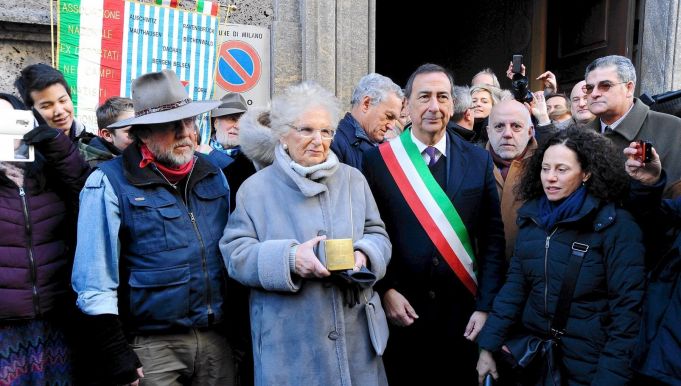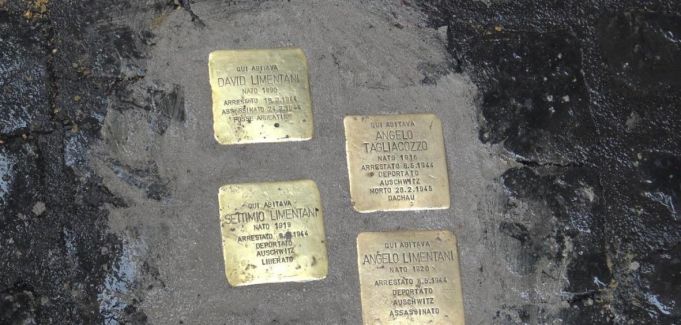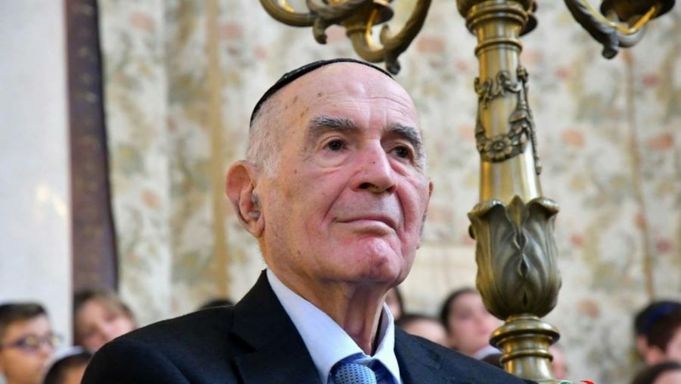Italy remembers victims of the Holocaust 77 years after the liberation of Auschwitz.
Italy marks International Holocaust Remembrance Day on 27 January with hundreds of commemorative events on the 77th anniversary of the liberation of the Auschwitz-Birkenau extermination camp.
Established in 2005 by the UN to commemorate the day in 1945 that the survivors of Auschwitz were liberated by the Russian army, the initiative honours the memory of the millions of Jews – but also homosexuals, Romany people and others – who suffered persecution, deportation, imprisonment and genocide.
Ahead of the Giorno della Memoria, new stolpersteine Holocaust memorial stones were unveiled in Rome as well as other Italian cities including Milan, Venice, Florence, Trieste and Genoa.
The bronze-capped cobblestones, whose name translates as "stumbling stones", are part of a major European-wide project begun by German artist Gunter Demnig in 1997.
The memorials are installed outside the last chosen place of residence of victims of the Holocaust, listing their names, date of birth, date and place of deportation, and - in most cases - their date of death in a Nazi extermination camp.
Milan
In Milan 24 new stolpersteine were laid, bringing the total in the city to 145, reports Italian newspaper La Repubblica.
This year's Giorno della Memoria programme was presented by the mayor Beppe Sala in the company of the Milan-born Holocaust survivor Liliana Segre.

One of the few Italian Jewish children to survive deportation to a Nazi death camp, Segre was made a senator for life in 2018, an honour in tribute to her years of speaking about the horrors of the Holocaust.
During last week's presentation in Milan, Segre chose to tell “a little story” about Ermanno Fontanella, who was commemorated with a memorial stone outside his former home on Corso Venezia 39.
When the 13-year-old Segre and her father Alberto were imprisoned in Milan's S. Vittore jail, in December 1943, they met their friend Fontanella inside.
“As soon as we arrived he said: 'Alberto, thank goodness you have been arrested now because until recently there was a German commander much worse than the current one, who forced us to lick the latrines.”
Segre recalled: "I still remember today, at 91 years old, that thing I heard when I was 13."
After 40 days in jail, the young girl and her father was shoved onto a carriage on Platform 21 in Milan Central Station, today the site of a Holocaust Memorial.
Those on the train did not realise their destination was the Auschwitz-Birkenau death camp.
On arrival Liliana was separated from her beloved father. She never saw him again. Alberto Segre was murdered in Auschwitz on 27 April 1944.
Rome
The 18 new stolpersteine in Rome, which have been added to the 336 already present on the streets of the capital, are dedicated to those who were either deported to Auschwitz or killed in the Fosse Ardeatine massacre.
Two new memorial stones were installed on Viale delle Milizie 11, in the city's Prati district, where Enzo and Luciano Camerino were dragged out of their home by the Nazis on 16 October 1943.
The brothers were among the 1,024 Roman Jews, including 200 children, rounded up at dawn before being sent to Auschwitz on a sealed train from Tiburtina station two days later.
Only 16 were to make it back alive: 15 men and one woman, Settimia Spizzichino from the Garbatella quarter, whose white steel bridge is named in her honour.
Also among the 16 survivors were Enzo and Luciano Camerino who returned to Rome in July 1945.
Luciano died in Florence in 1966 and Enzo passed away in Canada in 2014. The men's daughters were present at the memorial ceremony in Rome.
Two other new stolpersteine were dedicated to David and Settimio Limentani, a Jewish father and son, outside their former home on Via dei Giubbonari 30, near Campo de' Fiori.

David Limentani had escaped the mass round-up in October 1943 by chance: he went out early to buy cigarettes and sensed danger when he saw the Nazi trucks, getting home in time to save his family.
However from that day on the situation for Jews who had managed to escape deteriorated even more.
It was necessary to hide, but also to continue somehow with daily life, to get food, to go to work using false names. David did just so, helped by his many friends in the neighbourhood.
However, on 16 March 1944, he was betrayed by some acquaintances who handed him over to the Nazi prison on Via Tasso where detainees were tortured and interrogated. Today it is a museum.
Fosse Ardeatine
Just over a week later David Limentani was killed by Nazi troops at the Fosse Ardeatine, on 24 March 1944.
The Fosse Ardeatine massacre was one of the most horrific atrocities carried out by the occupying Nazi forces against civilians in Italy.
A disused quarry near Via Appia Antica was chosen as the site for the mass killing of 335 people, in retaliation for a partisan attack on a column of marching German military police on Via Rasella the day before.
The SS command in Rome under Herbert Kappler called for a swift and brutal retaliation, apparently approved by Hitler himself, by which 10 Italians would be killed for every German police officer.
One of the SS officers in charge of carrying out the Fosse Ardeatine massacre, Nazi war criminal Erich Preibke, was extradited to Italy from Argentina in 1995.
Priebke died in Rome in 2013, under house arrest, aged 100, without ever expressing any remorse.
David's son Settimio Limentani was arrested and deported to Auschwitz on 8 May 1944, along with his brother Angelo and their friend Angelo Tagliacozzo, who lived in the same building.
The Nazis discovered them hiding in the roofspace, after being tipped off by an informant. The boys surrendered, under threat of their mother and younger sisters being deported, and they were subsequently sent to Auschwitz.
Settimio survived. His brother died in Auschwitz. Their friend Angelo died in Dachau.
After the liberation of Auschwitz, Settimio eventually made his way back to Rome, travelling much of the way by foot, along with another Italian Jewish teenager called Samuele Modiano, known to all as Sami.

Among those present at last week's unveiling of the stolpersteine on Via Giubbonari last week was Sami Modiano, now aged 91.
“It was the first time I arrived in Rome, I was 14 years old” - Modiano said as he recalled the homecoming, his voice cracked with emotion.
“Settimio hoped to receive good news about his father David and his brother Angelo. We arrived at Via dei Giubbonari 30. He whistled so his family would hear him. They did not answer the first time, but they did the third time. Then the windows were flung open: ''Settimio, Settimio!”'
Sami Modiano
Born in 1930 on the island of Rhodes, when it was under Italian occupation, Modiano was deported with his father Jacob and his sister Lucia to Auschwitz in 1944. He was the only one of his family to survive.
Modiano returned to Auschwitz for the first time in 2005 and since then he has dedicated himself to educating others, including school children, with his testimony.
On his 90th birthday he was awarded the Knight Grand Cross of the Order of Merit of the Italian Republic, the highest honour for an Italian citizen.
Speaking at the unveiling of the stolpersteine at Via dei Giubbonari 30 - where he lived for a short period - Modiano thanked "all those who make sure to remember these people.”
“Thank God, Settimio has left a beautiful family, life goes on" - Modiano said - "May the new generations ensure that what happened to us never happens again."
Statements from leaders in Italy
Italy's outgoing president Sergio Mattarella said that International Holocaust Memorial Day "does not only mean that we should remember the millions of dead, the grief and suffering of so many innocent victims, including many Italians. Rather it urges us to prevent and combat, today and in the future, all germs of racism, antisemitism, discrimination and intolerance."
Italian premier Mario Draghi stated: "Today we remember the horror of antisemitism and we renew our collective commitment to combat all attempts to cancel its memory."
In his general audience on Wednesday Pope Francis urged families to remind younger generations about the millions of people, particularly Jews, killed at the hands of the Nazi regime, saying: “This unspeakable cruelty must never be repeated.”
For Rome events commemorating International Holocaust Day / Giorno della Memoria see Culture Roma website, and for Milan events see Comune di Milano website. Cover photo Wanted in Rome.





















